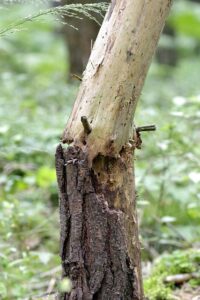Dangerous Trees on Private Land
What Every Landowner Should Know about Dangerous Trees on Private Land
That huge oak tree in your garden looks fine—until a storm hits. One crack, one gust of wind, and suddenly it’s crashed through your neighbour’s fence. Now you’re dealing with insurance claims, angry neighbours, and a very expensive cleanup. Better to know what Dangerous Trees on Private Land mean for you.
This isn’t just a “what if?” scenario. It happens more than you’d think. And if you own land in Scotland, the law says you’re responsible for making sure your trees don’t become a hazard.

Why Should You Care about Dangerous Trees on Private Land?
A few years back, a homeowner ignored a leaning tree in their garden. It had been there for decades. When Storm Arwen rolled in. The tree didn’t just fall—it took out a power line and blocked the road for two days. The cost of the cleanup was substantial.
The truth? Trees don’t give warnings like creaking floorboards. They can look healthy while rotting from the inside. And if they hurt someone or damage property, you could be held liable.
Spotting a Dangerous Tree
You don’t need to be an arborist to spot trouble. Look for:
Cracks or splits in the trunk or big branches.
Fungi growing at the base (a sure sign of rot).
Dead branches hanging over paths, roads, or buildings.
A sudden lean after heavy rain or wind.
If you notice a dangerous Tree on private land, don’t wait. Dead and dangerous tree removal now could save you thousands later.
What Should You Do?
1. Get a Professional Opinion about Dangerous Trees on Private Land
Not all tree surgeons are equal. Look for LANTRA-certified or Arboricultural Association-approved experts. They’ll tell you if a tree needs pruning, bracing, or full removal.
2. Check for Tree Preservation Orders (TPOs)
Some trees are protected, even if they’re dangerous. Your local council might need to approve work before you touch them. Cutting one down illegally? That’s a fine of up to £20,000.
3. Act Before the Storm Hits
Emergency call-outs for Storm Damage tree Removal Services cost three times more than planned work. If a tree looks risky, don’t wait for the next big storm to make the decision for you.
4. Keep Records
Take photos, save reports, and note inspections. If something does go wrong, good records can protect you from liability claims.
The Bottom Line
Trees are beautiful—until they’re not. A little attention now can save you from disasters (and legal headaches) later.
So, take a walk around your property. Look up. Anything seem off? If so, it’s time to call in the pros. Trust me, your future self will thank you.
Got a tree horror story or a close call? Share it in the comments—sometimes the best lessons come from real-life near-misses!
